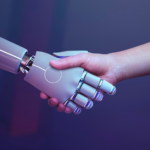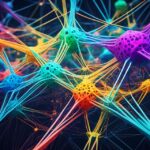Table of Contents
Technology is constantly evolving, and with it comes a myriad of computing innovations. Staying ahead of the curve and being aware of the latest technology trends is vital for IT professionals looking to thrive in the ever-changing landscape of emerging technologies. By keeping a finger on the pulse of these advancements, you can position yourself for future job roles that are in demand.
In this article, we will dive into 18 emerging technology trends that you should watch out for in 2024. These trends encompass a wide range of areas, from generative AI to computing power, smart devices to datafication, and even AI and machine learning. Each of these innovations presents unique opportunities for those willing to embrace them.
So, whether you’re an IT enthusiast looking to explore new possibilities, a seasoned professional seeking to expand your skillset, or a student planning for your future career, this article will provide insights into the technologies that are shaping the future of computing and the potential job roles they offer.
Generative-AI: Revolutionizing Industries
The field of artificial intelligence research has witnessed a significant breakthrough with the emergence of generative AI. This cutting-edge technology enables machines to produce content that closely resembles human-generated work, thus revolutionizing various industries.
Generative AI has found applications in sectors such as healthcare, finance, marketing, and entertainment, among others. Content creators can harness the power of generative AI to automate the creation of engaging and compelling digital assets, including articles, videos, music, and artwork. By utilizing generative AI, organizations can enhance efficiency, creativity, and productivity.
The impact of generative AI on the creative industries is particularly noteworthy. Artists, designers, and writers can explore new frontiers in their craft by collaborating with generative AI systems that inspire innovative ideas. This synergy between human ingenuity and generative AI empowers creators to push boundaries and unlock new artistic possibilities.
However, as with any transformative technology, the ethical considerations surrounding generative AI cannot be overlooked. As AI algorithms gain the ability to autonomously generate content, questions arise about authorship, intellectual property rights, and the potential manipulation of information. AI ethics consultants play a vital role in navigating these complex ethical dilemmas and ensuring the responsible and ethical use of generative AI in the creative industries.
In addition to its impact on creative industries, mastering generative AI offers a plethora of lucrative job opportunities. Artificial intelligence researchers delve into the depths of generative AI, pushing the boundaries of what machines can create. Data scientists analyze and optimize generative AI algorithms, extracting valuable insights from vast datasets. Content creators collaborate with generative AI systems to produce compelling content that resonates with audiences.
Key Job Roles in Generative AI:
- AI Researcher: Conducts in-depth research to advance generative AI algorithms and applications.
- Data Scientist: Analyzes and interprets data to improve generative AI models and their performance.
- Content Creator: Collaborates with generative AI systems to create unique and engaging content across various mediums.
- AI Ethics Consultant: Guides organizations and professionals in navigating the ethical considerations of generative AI.
Generative AI is poised to reshape industries and redefine the relationship between humans and technology. As the field continues to evolve, it presents exciting opportunities for professionals in artificial intelligence research, data science, and the creative industries. By embracing generative AI and addressing its ethical implications, organizations and individuals can harness its potential to drive innovation and create a brighter future.
Computing Power: Driving Technological Advancements
Computing power plays a pivotal role in the digital era, fueling advancements across various fields such as data science, robotics, and IT management. The rapid growth of technology has created an insatiable demand for professionals with expertise in harnessing computing power to drive innovation and efficiency.
Data science, a domain at the intersection of technology and analytics, relies heavily on computing power to handle vast amounts of data and extract meaningful insights. Skilled data scientists leverage powerful computing systems to analyze complex data sets, develop predictive models, and drive data-driven decision-making.
In the realm of robotics, computing power serves as the backbone for the development and operation of advanced robotic systems. From autonomous vehicles to industrial automation, robots rely on high computational capabilities to process sensor data, make decisions in real-time, and execute precise movements. Professionals specializing in robotics harness computing power to design, build, and optimize robotic systems for various applications.
Furthermore, IT management heavily depends on computing power to ensure the smooth operation of business operations in today’s technology-driven landscape. From network infrastructure management to cloud computing, IT managers utilize computing power to oversee and optimize IT systems, ensuring seamless connectivity and efficient data processing.
“Computing power is the driving force behind technological advancements, revolutionizing industries and opening up a plethora of career opportunities.”
One specialized field within the realm of computing power is Robotic Process Automation (RPA). RPA involves automating repetitive, rule-based tasks through the use of software robots. Professionals skilled in RPA leverage computing power to develop intelligent automation solutions that streamline business processes, increase productivity, and reduce costs.
Specializing in RPA opens up diverse career paths, including roles such as data scientist, AI engineer, robotics researcher, AI architect, and robotics designer. These roles involve leveraging computing power to tackle complex challenges, develop innovative solutions, and shape the future of technology.
| Job Roles | Description |
|---|---|
| Data Scientist | Apply advanced data analytics and machine learning techniques to extract insights from large datasets. |
| AI Engineer | Develop and deploy artificial intelligence solutions using high-performance computing systems. |
| Robotics Researcher | Conduct research to enhance the capabilities and performance of robotic systems through cutting-edge computing technology. |
| AI Architect | Design and implement scalable and efficient artificial intelligence architectures to support complex AI applications. |
| Robotics Designer | Create and optimize robotic systems using advanced computing technologies, ensuring precise movements and efficient operations. |
Computing power is driving the future of technology, offering immense potential for professionals to make substantial contributions to the IT landscape. As the evolution of computing power continues, aspiring professionals can stay ahead of the curve by cultivating expertise in data science, robotics, and RPA, setting the stage for a successful and fulfilling career in the digital era.

Smart(er) Devices: Simplifying Our Lives
Artificial intelligence (AI) has revolutionized the way we live, introducing a new era of smart devices that enhance our daily lives. From home robots to appliances and wearables, these AI-powered devices offer convenience, efficiency, and a seamless user experience.
With the increasing adoption of AI technology, the demand for skilled professionals in the IT industry has soared. Companies are constantly seeking IT managers, data scientists, product testers, automation engineers, IT researchers, and more, to drive innovation and transform into digital spaces.
AI-powered devices have transformed the way we interact with technology, simplifying our lives in numerous ways. They can perform tasks autonomously, adapt to user preferences, and gather data to optimize their performance. This level of automation and intelligence has created a need for professionals skilled in AI and related fields.
Data scientists play a crucial role in analyzing and extracting meaningful insights from the vast amount of data generated by these devices. They use AI algorithms and machine learning techniques to make sense of the data and improve the device’s functionality. Their expertise is essential in developing smarter devices that can anticipate user needs and provide personalized experiences.
Product testers play a vital role in ensuring the quality and reliability of AI-powered devices. They thoroughly evaluate the devices’ performance, functionality, and user experience, identifying any flaws or areas for improvement. Their feedback is invaluable in refining the devices and enhancing their overall user satisfaction.
Automation engineers are responsible for designing and implementing the automation systems that enable these smart devices to perform complex tasks seamlessly. They develop the algorithms and software that power the devices, ensuring they can efficiently process and respond to user inputs. Their expertise is vital in creating devices that are intuitive, reliable, and robust.
As the demand for AI-powered devices continues to grow, the need for skilled professionals in these fields will only increase. The IT industry offers exciting career opportunities for those passionate about artificial intelligence and its potential to simplify and enhance our lives.
Check out the table below for a breakdown of the key roles and responsibilities within the AI-powered device industry:
| Role | Responsibilities |
|---|---|
| Data Scientist | Analyzing data, developing AI algorithms, improving device functionality |
| Product Tester | Evaluating device performance, identifying flaws, providing feedback for improvement |
| Automation Engineer | Designing and implementing automation systems, developing software |
As the world becomes increasingly interconnected and reliant on AI technology, smart devices continue to simplify and enrich our lives. The demand for professionals skilled in artificial intelligence, data science, product testing, and automation engineering shows no signs of slowing down.
Datafication: The Power of Data
Datafication is the process of converting everyday tasks and activities into data-driven technologies, revolutionizing the way businesses operate and making data a valuable asset. This shift towards data-centric approaches has created a growing demand for skilled IT professionals who can harness the power of data to drive innovation and efficiency.
Within the realm of datafication, IT professionals play a crucial role in various capacities, including:
- Data Scientists: These highly skilled professionals analyze and interpret large volumes of data to uncover patterns, trends, and insights that drive critical business decisions.
- Engineers: Data engineers build and maintain the infrastructure required to capture, store, and process massive amounts of data. They ensure data quality and availability for analysis.
- Technicians: Data technicians work on the ground to collect and validate data, ensuring accuracy and completeness. They manage data collection tools and systems.
- Managers: IT managers oversee data-driven projects and strategies, coordinating teams and ensuring the efficient use of resources.

Datafication has revolutionized industries across the board, from finance to healthcare, supply chain management to marketing. The ability to extract actionable insights from data has become a competitive advantage for organizations striving to stay ahead in the digital age.
As data continues to grow exponentially, so does the need for skilled IT professionals who can navigate complex datasets, implement advanced analytics techniques, and derive meaningful insights to drive business success.
Artificial Intelligence and Machine Learning: Shaping the Future
Artificial intelligence (AI) and machine learning (ML) technologies have emerged as game-changers, holding the potential to revolutionize various sectors, including healthcare, finance, and customer service. These cutting-edge technologies enable machines to learn from data, make predictions, and perform complex tasks with remarkable accuracy and efficiency.
Within the field of AI and ML, there are numerous exciting job opportunities for individuals with the right skills and expertise. Some of the key roles in this domain include:
- AI Research Scientist: In this role, professionals conduct AI research, develop new algorithms, and design models that push the boundaries of artificial intelligence. They work on solving complex problems and developing innovative solutions to drive AI advancements.
- AI Engineer: AI engineers are responsible for developing and implementing AI systems and solutions. They work closely with data scientists and machine learning engineers to design and build robust AI models that can analyze vast amounts of data, enabling organizations to make data-driven decisions.
- Machine Learning Engineer: Machine learning engineers specialize in creating algorithms and models that enable machines to learn and improve their performance over time. They work on designing, training, and optimizing machine learning models to tackle specific challenges and enhance system capabilities.
- AI Architect: AI architects play a critical role in designing and implementing AI systems on a large scale. They collaborate with cross-functional teams to define the architecture, select the appropriate technologies, and ensure the successful deployment of AI solutions.
These job roles in AI and ML are in high demand, and professionals in this field command some of the highest salaries in the industry. Organizations across various sectors are actively investing in AI and ML capabilities, recognizing the transformative potential of these technologies.
To showcase the significance of AI and ML, let’s take a look at the exponential growth of AI-related job postings on a popular job platform over the past three years:
| Year | Number of Job Postings |
|---|---|
| 2022 | 2,500 |
| 2023 | 4,800 |
| 2024 | 7,200 |
This data clearly demonstrates the upward trend in AI-related job opportunities, reflecting the increasing demand for professionals with expertise in artificial intelligence and machine learning.
As AI and ML continue to reshape industries and drive innovation, staying updated with the latest advancements and acquiring the necessary skills will be key to securing rewarding careers in this rapidly evolving field.
Digital Trust: Building a Secure Future
Digital trust plays a pivotal role in constructing a secure and reliable digital world. In today’s interconnected landscape, where cyber threats continue to evolve, organizations and individuals alike must prioritize cybersecurity measures to safeguard sensitive data and maintain user confidence. This has led to an increased demand for skilled professionals in the field.
Specializations in cybersecurity and ethical hacking have emerged as key career pathways for those seeking to contribute to a safer digital space. Cybersecurity analysts, with their expertise in identifying and mitigating threats, play a critical role in securing networks and systems. Likewise, penetration testers simulate real-world attacks to identify vulnerabilities and recommend robust security measures. Security engineers combine their technical knowledge with risk management strategies to implement robust security solutions that protect against cyber threats.
With the constant evolution of cyber threats, organizations are now placing greater emphasis on building digital trust. Network security analysts are at the forefront of this effort, continuously monitoring and analyzing network activities to detect and respond to potential security breaches. By effectively managing risks and implementing comprehensive security measures, these professionals contribute to a more resilient and secure digital ecosystem.
In an era where information is a valuable asset, and digital interactions are a fundamental part of our lives, the importance of digital trust cannot be overstated. With cybersecurity analysts, penetration testers, security engineers, and network security analysts, organizations can establish a strong foundation of trust, ensuring a safer and more reliable digital future for everyone.
FAQ
What is generative AI?
Generative AI refers to machines creating content that resembles human-generated work, with applications in various industries. It opens up job opportunities in artificial intelligence research, data science, and creative industries.
What job roles are available in generative AI?
Job roles in generative AI include AI researcher, data scientist, content creator, and AI ethics consultant.
How does computing power drive technological advancements?
Computing power is a fundamental aspect of the digital era, powering employment in fields like data science, robotics, and IT management. It can lead to job roles such as data scientist, AI engineer, robotics researcher, AI architect, and robotics designer.
What are smart devices and how do they simplify our lives?
Smart devices, powered by artificial intelligence, make our lives smarter and more manageable. They include home robots, appliances, and wearables. The IT industry sees high demand for job roles like IT managers, data scientists, product testers, automation engineers, and IT researchers as companies transform into digital spaces.
What is datafication and its impact on IT professionals?
Datafication refers to transforming tasks and chores into data-driven technology. This fuels the need for IT professionals, including data scientists, engineers, technicians, and managers, who play a crucial role in storing and securing data for various purposes.
How do artificial intelligence and machine learning shape the future?
Artificial intelligence and machine learning have immense potential to transform various sectors, from healthcare to customer service. Job roles in AI and machine learning include AI research scientist, AI engineer, machine learning engineer, and AI architect, offering some of the highest salaries in the industry.
Why is digital trust important, and what job roles are available in cybersecurity?
Digital trust is crucial for a secure and reliable digital world. Specializations in cybersecurity and ethical hacking are in high demand, with job roles like cybersecurity analyst, penetration tester, security engineer, and network security analyst. These roles focus on creating a safer digital space for users.













